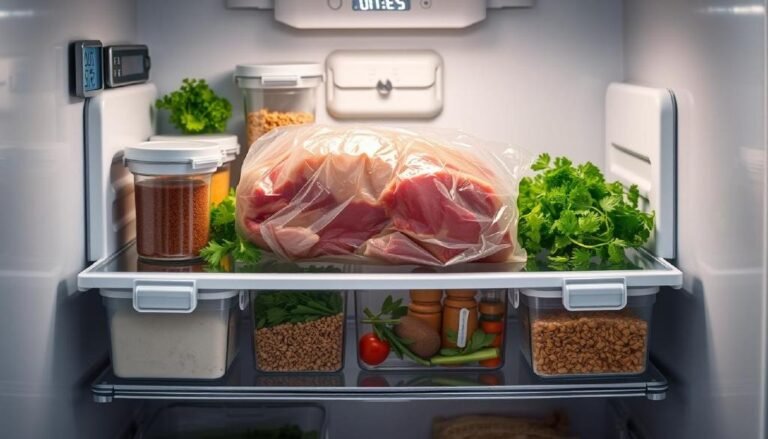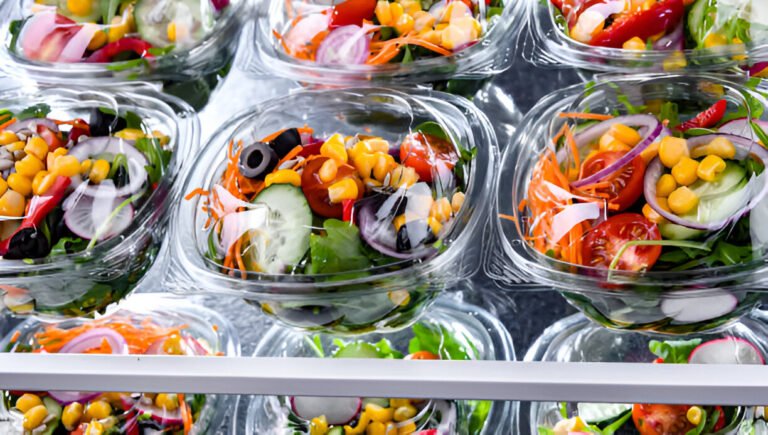Vacuum Sealed Chicken: How Many Days Can It Safely Stay in Your Fridge?
Let’s be real—chicken is a staple in most kitchens. It’s versatile, affordable, and downright delicious when cooked right. But here’s the thing: if you’re not handling and storing it properly, you’re playing a risky game with your health.
I’ve been there—standing in front of the fridge, staring at a vacuum-sealed package of chicken, wondering, “Is this still good?” or “How long has this been in here?” It’s a moment we’ve all had, and it’s one that can make or break your dinner plans (or worse, your stomach).
That’s what we’re diving into today. In this article, we’ll look at the shelf life of vacuum-sealed chicken. We’ll also discuss why this method is a big deal for food safety. Finally, we’ll share tips on how to use this storage method effectively. Whether you’re great at meal prep or just want to reduce food waste, this guide helps. You’ll get practical tips. You’ll learn how to keep your chicken fresh, safe, and ready to cook. So, let’s get cracking—because no one wants to gamble with their health (or their dinner).
How Long Will Vacuum Sealed Chicken Last in the Fridge?
Safeguarding everyone’s health starts with the basics: correctly handling poultry like chicken. And one of the best ways to keep chicken fresh and safe is by storing it in a vacuum-sealed container.
It’s like putting your chicken in a protective bubble. This keeps bacteria and spoilage away, so your tasty meal stays safe and healthy. But here’s the million-dollar question: How long can chicken stored in a vacuum seal actually last in the fridge?
Generally, a vacuum-sealed chicken can last for around three to ten days up to two weeks in the fridge. But several factors can differ in its shelf life.
Chicken meat is highly perishable; preserving a vacuum-sealed chicken in the fridge could be short-term. I think it’s better to freeze vacuum-sealed chicken instead of raw chicken in plastic containers.
Freezing can extend its shelf life for about nine to twelve months. Storing vacuum-sealed chicken in the freezer is suitable for long-term preservation. The shelf life will depend on the storage method you use in your vacuum-sealed chicken.
| Read: Can Chicken Breast Be Bruised? Do You Need A Vacuum Sealer For Sous Vide? How To Store Raw Chicken In Fridge After Opening? |
Shelf Life When Vacuum Sealed

Raw
The raw vacuum-sealed chicken will usually last three or four days in the fridge.
From my experience, raw vacuum-sealed chicken lasts just two to four hours at room temperature. You can store vacuum-sealed chicken in a freezer, extending its shelf life from nine months to a year.
On the other hand, raw marinated chicken can last up to 36 hours if you plan to put it in a dehydrator to make chicken jerky. But the average shelf life of your marinated chicken is 24 hours.
However, depending on vacuum sealing alone will not prevent it from spoiling. If it takes longer, bacteria can grow in the meat. This may lead to food poisoning if eaten. Find out if chicken should be at room temperature before cooking here.
Cooked
For cooked chicken, vacuum-sealed meat should last about three to four days if stored properly in the fridge. [1] But a cooked chicken outside the fridge will last only for a day.
A vacuum-sealed cooked chicken will last longer than usual, but it must still be consumed within four days.
Meanwhile, smoked vacuum-sealed chicken can last for about a day or two. It will take up to one month if you put a smoked vacuum-sealed chicken in the freezer. But how will you make chicken crispy without frying it?
Factors That Make Chicken Last Longer When Vacuum Sealed
Lack of Air
Removing air from the plastic zipper bag or chicken pouch can make it last longer when vacuum sealed. Thus, vacuum sealing preserves the freshness, flavor, and quality of meat for a long time.
You can use a vacuum packing technique to drain the air from a vacuum packaging before sealing it. If all the air is not removed, it can quickly damage the meat’s quality.
It can grow bacteria on the chicken if that air comes in contact with the meat. That’s why halting air exposure is a big help in preserving it.
Uncontaminated
You don’t want your whole chickens to be contaminated with water or vapor while vacuum sealing. When pouched is sealed, steam or water vapor can form an air bubble.
These air bubbles could form larger and could result in product contamination. So, ensure not to allow water or other unnecessary liquids to be drawn
Temperature
Storing a vacuum-seal chicken should be at the right temperature. Generally, you can store it at 40°F or below. Otherwise, the growth of the bacteria could grow quickly.
Also, you can put it on the shelves when storing meat in the fridge. The fridge door area has a lot of temperature changes because people open and close it often.
How To Tell If It Has Gone Bad
Appearance
The raw chicken has the usual light pink meat; if it changes color, it has gone bad.
Meanwhile, a cooked chicken has white meat underneath; it’s unsafe if it looks gray or discolored. Also, it’s spoiled if you touch a chicken that has a slimy texture or feels like mucus.
Smell
A raw chicken has gone bad if it holds a pungent and foul smell. But be cautious of the other spices that mask the odor of bad chicken. A chicken meal is spoiled if it has distinct pungent and rotten eggs.
Taste
You can usually tell if it’s spoiled by smell. Also, taking a small bite helps you see if it’s still good. Chicken that has gone bad will usually have a bad sour taste.
Molds
If there’s a part of a chicken that grows black or green fuzz, dispose of it. The strange colors could be bacteria or molds in the chicken. This may happen if the chicken is past its shelf life.
Proper Vacuum Sealing of Chicken
I recently discovered that proper vacuum sealing of chicken is a great technique to keep the freshness of your chicken. It can help to protect your meat from freezer burns. I usually add an oxygen absorber sachet or a plastic zipper bag to the plastic wrap.
Breaking a whole chicken into smaller portions is a great option to ensure no air is trapped in the chest cavity. Also, it is important to consider the quality of the meat before you vacuum seal chicken.
The fresher the chicken, the longer it will stay in the fridge. Lastly, ensure you put a label and store the chicken in the fridge for the proper timeframe.
What Are the Benefits of Vacuum-Sealing of Chicken?
- Vacuum-sealing chicken can preserve and prolong its storage life. These products come in vacuum-packed, air-tight packages. This helps stop bacteria from growing. [2].
- It protects against the dehydration of the chicken, making it fresher for longer.
- It prevents contamination.
- It helps reduce waste and keeps the chicken fresh longer.
Can Vacuum Sealed Chicken Last Longer in the Freezer than in the Fridge?
Yes, vacuum-sealed chicken lasts longer in the freezer than in the fridge. Based on my experience, the lower temperature and vacuum seal helps extend the shelf life of a chicken.
A vacuum-sealed chicken lasts about two weeks in the fridge. But if you freeze it, it can last up to nine months. Just make sure to store the chicken to avoid the freezer burn.
Pro Tips for Maximizing Chicken Freshness
Here are a few tricks I’ve picked up over the years to keep my vacuum-sealed chicken fresh and safe:
- Label Everything: Use a marker to write the date on the package when you buy it. No more guessing games.
- Rotate Your Stock: Put newer packages in the back and older ones in the front. First in, first out.
- Don’t Overcrowd the Fridge: Give your chicken some breathing room. Good airflow keeps the temperature consistent.
- Invest in a Fridge Thermometer: It’s a small gadget that can save you from big headaches.
FAQs on Vacuum Sealed Chicken
How long does defrosted vacuum-sealed chicken last in the fridge?
Defrosted vacuum-sealed chicken can last for up to fourteen days in the fridge. However, after a two-week period, the flavor and texture may not be as good as before.
Does vacuum sealing preserve chicken?
Yes, vacuum sealing helps preserve chicken. It removes extra oxygen, which slows down food spoilage. This helps keep the chicken fresh for a longer time.
Can bacteria grow on vacuum-sealed chicken?
Yes, there are cases where bacteria can grow on vacuum-sealed chicken. Some anaerobic bacteria can spoil food. So, check the chicken before cooking or reheating it.
Conclusion
Vacuum-sealed chicken can last around three to ten days in the fridge.
Removing air from the chicken helps stop bacteria growth. It also protects the meat from freezer burn.
But you must dispose of all chicken with discoloration, unusual odor, or gooey appearance. When in doubt, you can throw it out because consuming rotten meat might make you sick.
References:
- https://extension.umn.edu/preserving-and-preparing/storage-times-food-refrigerator-and-freezer
- https://ask.usda.gov/s/article/What-are-the-benefits-of-vacuum-packing-meat-and-poultry

Kathy is a restaurateur, artist, and blogger. After spending more than 10 years in the restaurant industry, she has decided to go digital and share her expertise and experience online.





